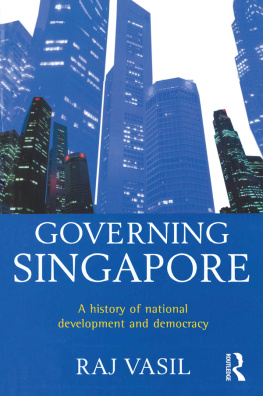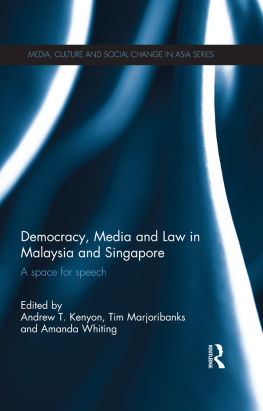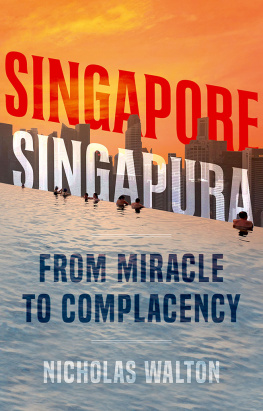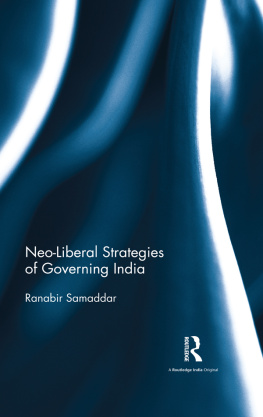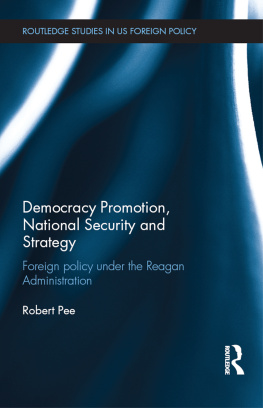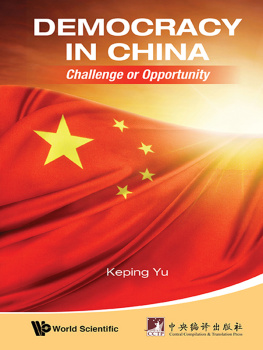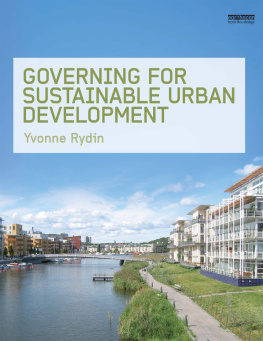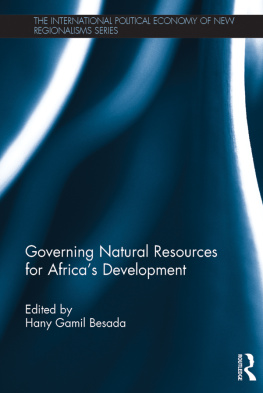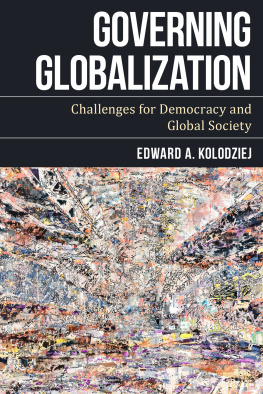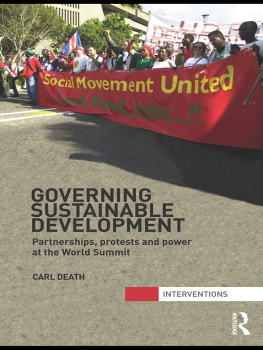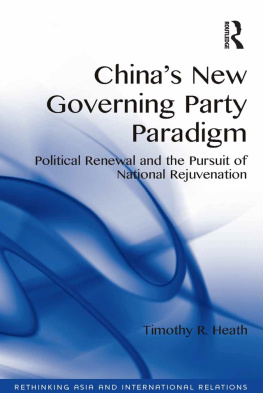GOVERNING SINGAPORE
The Institute of Southeast Asian Studies (ISEAS) was established as an autonomous organisation in 1968. It is a regional research centre for scholars and other specialists concerned with modern Southeast Asia, particularly the many-faceted problems of stability and security, economic development, and political and social change.
The Institutes research programmes are Regional Economic Studies (RES, including ASEAN and APEC), Regional Strategic and Political Studies (RSPS) and Regional Social and Cultural Studies (RSCS).
First published 1984 by Allen & Unwin
Published 2020 by Routledge
2 Park Square, Milton Park, Abingdon, Oxon OX14 4RN
605 Third Avenue, New York, NY 10017
Routledge is an imprint of the Taylor & Francis Group, an informa business
Copyright Raj Vasil 1984
All rights reserved. No part of this book may be reprinted or reproduced or utilised in any form or by any electronic, mechanical, or other means, now known or hereafter invented, including photocopying and recording, or in any information storage or retrieval system, without permission in writing from the publishers.
Notice:
Product or corporate names may be trademarks or registered trademarks, and are used only for identification and explanation without intent to infringe.
National Library of Australia
Cataloguing-in-Publication entry:
Vasil, R.K. (Raj Kumar).
Governing Singapore: democracy and national development.
Bibliography.
Includes index.
ISBN 1 86508 211 2.
1. DemocracySingapore. 2. SingaporePolitics and government.
I. Institute of Southeast Asian Studies (Singapore). II. Title.
320.95957
Set in 10.5/12.5pt Goudy by DOCUPRO, Sydney
ISBN-13: 9781865082110 (pbk)
The limited democracy of Singapore, reconciling democracy with national development, has delivered an exceptional social and economic revolution. From a poor, backward and ethnically divided tiny island of the Third World, Singapore has been transformed into a prosperous, self-confident and dynamic nation that today belongs to the First World. It is the pride of its people and the envy of many in the Third World.
I first visited Singapore in mid-1954, on my way to Indonesia as a graduate student from India. Since then I have been in Singapore almost every year, several times staying for periods of six months to a year. I have closely watched the remarkable transformation of the island and its people virtually year by year and I have no qualms about acknowledging that I am deeply impressed. Also, being an Indian, I have tended to look at Singapores limited democracy in relation to Indias Western liberal democracy. I believe if Indias democracy was real and it functioned effectively as an instrument of popular rule it would have inevitably produced the greatest good of the greatest number, a not unreasonable assumption being that if a people genuinely ruled themselveseven if through their chosen representativesthey must be able to deliver to themselves social and economic well-being and human dignity.
The essential question that has concerned me is: Do new Asian states stand a better chance of eventually securing a real and performing democracy by following the example of India or that of Singapore? India chose not only to introduce Western liberal democracy but also to persist stubbornly with it later even after it had become obvious that it failed to function according to its design and produce the greatest good of the greatest number. Singapore, on the other hand, learning from the dysfunction and failure of Western liberal democracy in countries like India, took a pragmatic view. Its rulers, unlike those of India, refused to be overly preoccupied with Western political norms and values and instead chose to establish a democracy that was limited but capable of producing national development, essential to the creation of the indispensable social and economic foundations of a democracy. It is a tragic irony that India, which had developed one of the most powerful national movements against colonial rule, today continues to cling to an essentially unadapted model of Western liberal democracy and stubbornly refuses to develop a variant of democracy of its own that is in harmony with Indias social and economic realities and that is capable of bringing about rapid national development.
Many Singaporeans have offered me a great deal of help and hospitality during the long period of my contact with Singapore. I am deeply indebted to them. I owe a special debt of gratitude to Prime Minister Goh Chok Tong who ever since 1983 has regularly given me many hours of his valuable time in conversations, willing to talk without insisting on any restrictions and with exceptional frankness. Special thanks are due to my friend, Dr Lau Teik Soon, without whose help Governing Singapore would not have been possible.
Raj Vasil
Wellington,
12 January 2000
For Lee Yoke Seng in friendship
Singapore, as an economic and political entity, was essentially founded in 1819 by the British colonial administrator, Stamford Raffles. Eight years later it was joined with Malacca and Penang to form the Straits Settlements and was ruled by the East India Company until 1858; the British government assumed direct responsibility over the settlements in 1867. From this moment Singapore was launched on its fateful course to become the chief centre of trade and commerce in Southeast Asia.
In the wake of the British came large numbers of new immigrants, mostly Chinese and Indians and others from the neighbouring countries of the region, and a multi-ethnic settlement was created. Trade and commerce, under the aegis of the British, flourished and the island began to supplant the other key trading centres of Southeast Asia. Four chief factors promoted the phenomenal economic expansion and growth of Singapore: its location at the centre of the vital sea-lanes of South and East Asia; a free trade policy that imposed no taxes on trade or industry; a stable and predictable colonial administration; and a hard-working and enterprising population. Significantly, these have continued to remain the key assets and strengths of modern Singapore.
Because geographically Singapore was an integral part of Malaya, the British sought to merge Singapore with its hinterland to give the settlement long-term viability. However, the strong opposition of the indigenous rulers of the nine Malay states, who were fearful that the merger would inevitably constitute the beginning of the process to incorporate their sovereign states into a British colony, caused this move to fail and Singapore remained a separate Crown colony ruled directly by the British until 1963. Its existence as a separate political entity, its preoccupation with trade and commerce, and its predominantly immigrant population which lacked any strong sense of nationhood contributed to its slow and late transition to independence.
With most colonial countries having achieved independence, and with the militant anti-colonial rhetoric and increasingly ominous threats of Indonesian President Sukarno, the British, in the early 1960s, came to feel intense pressure to decolonise Singapore. However, as Singapore was crucial to British and Western strategic and defence interests and as Britain had large investments in trade and industry on the island, they were willing to decolonise but not to allow it to become a sovereign, independent entity. It took Singapore until 1963, several years after Malayan independence in 1957, to secure decolonisation and finally full independence in 1965, this independence resulting in power being assumed by a radical anti-colonial movement, the Peoples Action Party (PAP), which represented a united front of social democrats and pro-communists.

